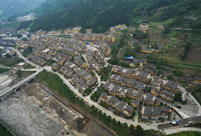MANILA, May 16 -- After a long dry spell, portfolio investments, popularly known as"hot money,"have flowed back to the Philippines with a net inflow of 324 million U.S. dollars recorded in April, the first in four months.
According to the Bangko Sentral ng Pilipinas (BSP), the country' s central bank, the net inflow arose from investors'optimism about the country's economic growth and its capacity to weather further cuts in the United States Federal Reserve's stimulus program.
However, BSP data showed despite the improvement, the country was still way behind last year's strong performance.
In 2013, hot money inflow reached a record high of 4.22 billion U.S. dollars. This year, the BSP expects the figure to be cut in half.
The BSP said while registered investments of 1.9 billion U.S. dollars were lower by 12.1 percent compared to the previous month' s 2.1 billion U.S. dollars, outflows declined to 1.5 billion U.S. dollars from 2.2 billion U.S. dollars in March 2014.
A report released by the Singapore Exchange (SGX) also showed that portfolio investments that flowed to Thailand, Indonesia and the Philippines rose to 1.7 billion U.S. dollars in March this year.
Another report released by the Bank of America Merrill Lynch ( BAML) in March showed that Southeast Asia overtook China in inward foreign direct investments (FDIs) last year.
The report showed that FDIs into Indonesia, Thailand, the Philippines, Malaysia and Singapore, collectively known as ASEAN-5, climbed by 7 percent to 128.4 billion U.S. dollars last year, while China faced a 3 percent drop to 117.6 billion U.S. dollars.
"Rising FDIs into ASEAN will likely remain a favorable structural trend over the next few years given favorable demographics, competitive wages and geopolitical competition between the superpowers," BAML noted.
Analysts here said that portfolio investments as well as foreign direct investments (FDIs) will continue to flow to the Philippines as a result of the latest investment upgrade given to the country by international rating agency Standard and Poor's (S& P).
Last week, S&P raised the Philippines'long-term sovereign credit rating to BBB from BBB-, citing the country's strong external liquidity and effective monetary policy that has sustained low inflation and interest rates.
In raising the ratings on the Philippines, S&P said"We expect ongoing reforms on a broad range of structural, administrative, institutional and governance issues to endure beyond the term of the current administration."
S&P also expressed optimism that the gains in revenue generation, spending efficiency and improvements in public debt profile as well as the investment environment will be sustained under the next administration. "The rating upgrade is a signal that the country's overall economy is doing well," First Grade Finance Managing Director and economist Astro del Castillo was quoted as saying in a media report. "This will attract more investors and fund institutions to take another look at the Philippines given that S&P already affirmed our capacity to pay our debts,"he added.
Economist Cid Terosa from the University of Asia and the Pacific said the upgrade should help boost the country's investment credibility."At the same time, we can get lower interest rates for our loans. In short, it will heighten our business and investment prospects,"Terosa said.
But economist and former budget secretary Benjamin Diokno said he believes the rating upgrade from S&P will have very little impact on the lives of the common man. "It's another indication that the risk of lending to the Philippines has improved. But the whole world knows that already. It's reflected in the spread on Philippine bonds. There's no need for rating agencies to validate that. Given our current economic realities, getting even higher ratings should be the least of our priorities,"Diokno said.
Meanwhile, an international property consultancy firm urged the Philippines to implement structural, economic and constitutional reforms to attract more foreign investments.
David Leechiu, country head and international director of Jones Lang LaSalle Philippines, Inc. (JLL), said these reforms will ensure the growth in foreign investments over the long term.
According to Leechiu, current laws on corporate and property ownership, land leasehold terms and taxes in the Philippines are the main barriers to foreign investments.
He said that foreign investors are not allowed to own land in the Philippines and a lease must not exceed 50 years, renewable for another 25 years.
Leechiu said that foreign capital in corporations is limited to 40 percent since 60 percent is reserved for Filipinos.
Compared to other countries in Asia, the Philippines is" relatively inaccessible" to foreign investors, Leechiu said.
Some Asian countries allow 50-100 percent foreign ownership in corporations and have more attractive land ownership incentives and land leasehold terms.
 A bite of Jiang Nan
A bite of Jiang Nan PLA's tough exercises
PLA's tough exercises Best photos of the week
Best photos of the week  When we are young...
When we are young... Wedding photos of world champion
Wedding photos of world champion "The Most Beautiful Chinese Land"
"The Most Beautiful Chinese Land"  Men experience pains of childbirth on Mother's Day
Men experience pains of childbirth on Mother's Day  J-11 fighters training in complex meteorological conditions
J-11 fighters training in complex meteorological conditions Six years after Wenchuan earthquake
Six years after Wenchuan earthquake  8 great movies to watch with your mom
8 great movies to watch with your mom China's most luminous celebrities
China's most luminous celebrities Newly recruited police in Hetian hold drill
Newly recruited police in Hetian hold drill  Bird-men compete flying in Hong Kong
Bird-men compete flying in Hong Kong  The 'Chinese Dad'
The 'Chinese Dad' Shanghai locals bid farewell to childhood memories
Shanghai locals bid farewell to childhood memoriesDay|Week|Month